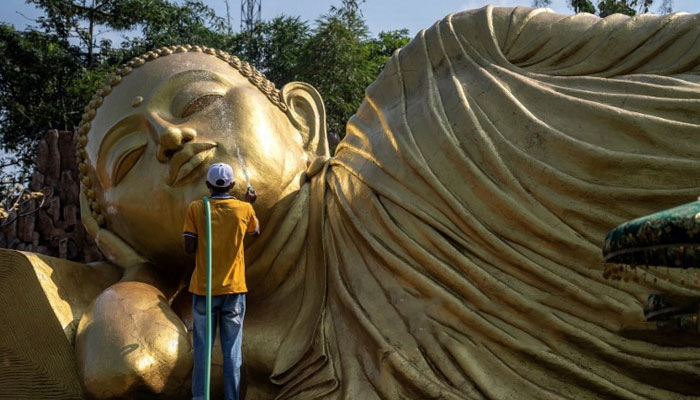A peaceful life
December 8 holds immense significance for the followers of Gautama Buddha, the messenger of peace, around the world. Historically, Bodhi Day commemorates the day when Prince Siddhartha, who grew up in a royal family in a Himalayan state, departed from his palace to discover the harsh realities of life, 2,500 years ago.
He left his native land as a magnificent prince, but when he returned after a long time, he became a ‘sadhu’ who was dressed in a simple saffron dress, holding a ‘kashkol’ in his hand and had a shaved head in place of his attractive curly long hair.
During his journey to know the truth of life, the prince stopped at various places to face extreme poverty and miseries. However, he was interested in knowing why humans suffer pain; why people quarrel with each other; and how pain can be defeated to transform the earth into a cradle of peace.
Finally, under a tree, the prince attained enlightenment and the facts of life became clear to him, thus, Siddhartha was forever immortalized in history as Gautama Buddha. This date was the eighth day of the last month of the lunar calendar of that time.
However, after the Meiji reforms in Japan, the Gregorian calendar was adopted and thus, this day is celebrated as Bodhi Day every year in December to commemorate Gautama Buddha’s attainment of Nirvana (enlightenment). On this day, monks decorate temples beautifully with colours and candles, and Buddhist followers used to reaffirm their commitment to following the peaceful teachings of Buddha.
During the reign of Ashoka the Great, the Gandhara region transformed into a stronghold of Buddhism, and Taxila, the ancient city of modern-day Pakistan, emerged as the centre of Gandhara. Due to its socio-religious significance, monks from all over the world started coming there, and students from neighbouring countries got enrolled in the educational centres of Takht-e-Bahi located in Mardan.
During this era, the great philosopher Kautilya Chanakya also taught wisdom at the ancient Takshashila University, where he also wrote his famous books Arthashastra and Chanakya Niti. The area of the present Islamabad was also an integral part of Gandhara in ancient times.
It is therefore the desire of every Buddhist to go on a pilgrimage at least once in his/her life to Pakistan and see the archaeological sites of Gandhara as well as sacred antiques currently preserved in different museums of Pakistan.
While international organizations, including the UN, are trying to promote international religious tourism in the name of the Buddhist Circuit, I would like to once again present my proposal, as the chairperson of the task force on Gandhara tourism, that Pakistan should establish a Gandhara corridor with Buddhist-majority countries in the region, in which priority should be given to Nepal, China, Thailand, Japan, Sri Lanka, Vietnam, Cambodia, Bhutan, Indonesia, Myanmar, Malaysia, Singapore and Mongolia. Such countries are considered close to Pakistan on the diplomatic front and citizens of most of these countries enjoy the visa-on-arrival facility.
Under the proposed Gandhara corridor, if the government of Pakistan makes arrangements for special pilgrimage flights by connecting Islamabad (an important part of Gandhara in ancient times) with the capitals of the above-mentioned countries, it would be proven as a game changer and a highly impressive initiative for connecting Pakistan with the Buddhist world.
This initiative would attract huge revenue, initially $1.75 billion if just 0.1 per cent of the international Buddhist population visits Pakistan for a 10-day pilgrimage in the first year, followed by $3-6 billion in the next financial years gradually. It would also help achieve many successes on the diplomatic front and promote a peaceful image of our beloved country.
Happy Bodhi Day!
The writer is a former member of the National Assembly and patron-in-chief of the Pakistan Hindu Council. He tweets/posts @RVankwani
-
 Chris Hemsworth Gets Candid About Daughter’s Drawings That Inspired Several Of His Tattoos
Chris Hemsworth Gets Candid About Daughter’s Drawings That Inspired Several Of His Tattoos -
 UK To Experience Rare 'Blood Rain' On Tuesday Feb. 24, 2026: Know Every Detail
UK To Experience Rare 'Blood Rain' On Tuesday Feb. 24, 2026: Know Every Detail -
 Maria Shriver Shares Heartbreaking Reminder After Eric Dane's Death: 'Next Week Isn't Guaranteed'
Maria Shriver Shares Heartbreaking Reminder After Eric Dane's Death: 'Next Week Isn't Guaranteed' -
 Andrew Mountbatten Windsor Gets New Moniker After Losing ‘Prince’ Title
Andrew Mountbatten Windsor Gets New Moniker After Losing ‘Prince’ Title -
 Jack Black Shares Unseen Moments With Tanya Haden: 'My Love'
Jack Black Shares Unseen Moments With Tanya Haden: 'My Love' -
 Shamed Andrew Made Taxpayers Fund Personal ‘massages’
Shamed Andrew Made Taxpayers Fund Personal ‘massages’ -
 What Could Be Nick Reiner's Fate After Pleading Not Guilty Parents’ Murder Case?
What Could Be Nick Reiner's Fate After Pleading Not Guilty Parents’ Murder Case? -
 Princess Kate Talks About 'hard Conversations' With Kids Amid Andrew Drama
Princess Kate Talks About 'hard Conversations' With Kids Amid Andrew Drama -
 Prince William Mocked For Being ‘most Reluctant’ King-in-waiting
Prince William Mocked For Being ‘most Reluctant’ King-in-waiting -
 Prince William Makes Rare Admission After Andrew Arrest
Prince William Makes Rare Admission After Andrew Arrest -
 ‘Got A Lot Of People Gunning For Me’: Trump Makes First Comments On Mar-a-Lago Intruder
‘Got A Lot Of People Gunning For Me’: Trump Makes First Comments On Mar-a-Lago Intruder -
 What Countries Have A Say In Andrew Removal From Line Of Succession?
What Countries Have A Say In Andrew Removal From Line Of Succession? -
 How Did Luci4 Die? Police Probes 'BodyPartz' Sudden 'suspicious' Death
How Did Luci4 Die? Police Probes 'BodyPartz' Sudden 'suspicious' Death -
 King Charles Criticized By Princess Anne Over Andrew Drama
King Charles Criticized By Princess Anne Over Andrew Drama -
 Kelly Osbourne Hits Back At 'absolutely Devastating' Body Shaming Comments
Kelly Osbourne Hits Back At 'absolutely Devastating' Body Shaming Comments -
 Hailee Steinfeld Details Preparations Ahead Of Welcoming First Kid With Josh Allen
Hailee Steinfeld Details Preparations Ahead Of Welcoming First Kid With Josh Allen




